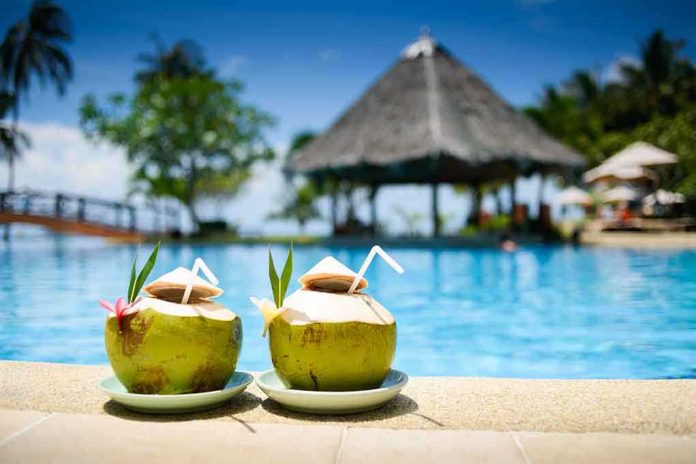
A wave of methanol poisonings abroad exposes the deadly risks of unregulated alcohol markets, leaving innocent travelers permanently disabled or dead—and the global response remains grossly inadequate.
Story Snapshot
- Recent methanol poisonings in tourist hotspots like Bali and Laos have caused blindness and death among Western travelers.
- Contaminated or counterfeit alcohol, often found in unsealed or suspiciously cheap drinks, is the root of the crisis.
- Survivors and health authorities urgently warn travelers to avoid unsealed beverages, as a single shot can be fatal.
- Regulatory failures in destination countries leave tourists vulnerable, with limited accountability for those responsible.
Deadly Consequences of Contaminated Alcohol Abroad
Multiple cases of methanol poisoning among tourists in Southeast Asia and other destinations have drawn international attention after several high-profile victims went blind or died in late 2024 and 2025. Backpackers in Laos, partygoers in Bali, and even seasoned travelers in Turkey have become victims simply by consuming what appeared to be an ordinary cocktail or shot. The primary threat: alcohol tainted with methanol—a toxic, industrial chemical sometimes added to drinks by unscrupulous producers seeking higher profits, regardless of human cost.
Health authorities warn that methanol is impossible to detect by taste or smell, making it a silent killer in unsealed or unlabeled bottles. In November 2024, six young women died in Laos after drinking at a hostel, while early 2025 saw 33 deaths in Istanbul and ongoing incidents in Bali and beyond. In August 2025, Canadian tourist Ashley King lost her sight after a single tainted cocktail in Bali—a case that made headlines and fueled survivor-led awareness campaigns. Despite the clear risks, many popular destinations still fail to enforce rigorous food and beverage safety standards, allowing illicit alcohol markets to thrive.
How Regulatory Failures and Greed Put Travelers at Risk
Methanol poisoning is not a new phenomenon, but the global spike in cases reflects deeper issues: weak enforcement, high taxes driving black-market production, and profit-driven disregard for safety. Illicit manufacturers—motivated by economic gain—substitute or adulterate safe drinking alcohol (ethanol) with methanol, which costs less but is highly toxic. In many affected countries, regulatory agencies and local authorities lack the resources or political will to police every bar, hostel, or street vendor. Tourists, unfamiliar with local supply chains and often drawn to cheap drinks, unwittingly become prime targets for this deadly scam.
Survivors like Ashley King now lead social media campaigns, urging fellow travelers to avoid unsealed bottles and suspiciously low-cost drinks. Yet, the hospitality sector, often unaware, may serve contaminated alcohol, while local officials face little pressure to enforce change. This leaves a dangerous gap: the very people fueling tourist economies are left unprotected, their health and lives at risk for a few extra dollars in illicit profit.
Health Impact and the Push for Accountability
The immediate effects of methanol poisoning are devastating—nausea, confusion, blindness, organ failure, and, in many cases, death. Survivors endure lasting disabilities, such as permanent vision loss, and families face the lifelong consequences of a tragedy that was entirely preventable. Healthcare systems in destination countries bear the burden of treating these acute poisonings, often lacking resources for rapid intervention. Meanwhile, the economic toll of declining tourism and reputational damage is mounting for affected regions.
Global health authorities, including the World Health Organization and CDC, now urge travelers to avoid unsealed, unlabeled, or unusually cheap alcoholic drinks and to seek immediate medical help if symptoms arise. Calls for stricter regulation and enforcement are growing, but meaningful reform remains slow, with regulatory gaps persisting in many high-risk destinations. Until accountability improves, the onus remains on travelers themselves to stay vigilant and protect their own safety.
Woman goes blind after drinking tainted cocktail, warns tourists that 'a shot can kill you' https://t.co/6XSvs3QuOt
— KarmikPatriot (@Safetman52) August 21, 2025
Limited international coordination means that, despite increased awareness, little has changed on the ground. Advocacy from survivors and some travel medicine experts continues to push for better oversight, but for now, the risk remains high—especially for those seeking adventure in countries where authorities have failed to put safety before profit.
Sources:
Methanol poisoning: What young travellers need to know
Woman goes blind after drinking tainted cocktail, warns tourists that ‘a shot can kill you’
Woman goes blind after drinking cocktail, warns tourists: ‘A shot can kill you’
Alcohol & Methanol Poisoning Abroad
Laos methanol poisoning victim saw kaleidoscopic light, then went blind



